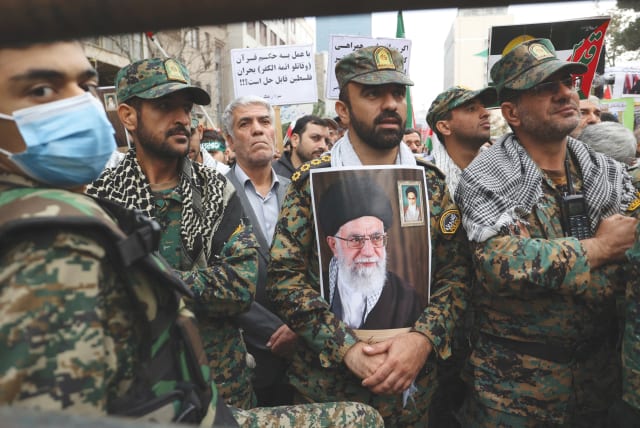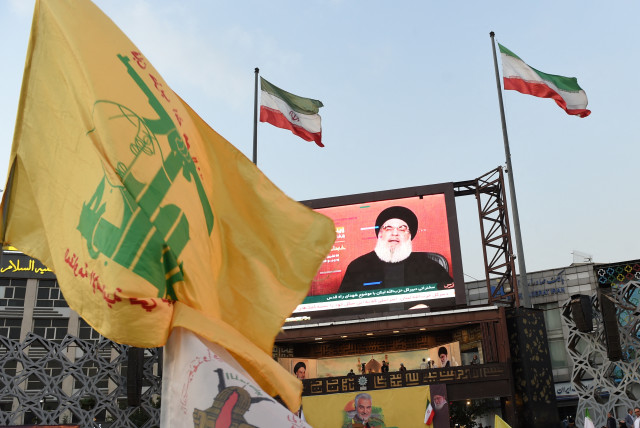How to combat terrorism while specifically addressing Iran - opinion

Only through concerted efforts can we effectively counter the sponsorship of terrorism and work toward fostering peace and stability in the tumultuous Middle East.
The terrorist attack by Hamas on Israel, which resulted in massive casualties, hostages, and heightened tensions in the Middle East, has served as a stark reminder of the pressing need for a united and well-coordinated response to the global issue of terrorism. At the core of this complex challenge lies the involvement of the Islamic Republic of criminal mullahs in Iran, a significant state sponsor of terrorism in the region. It is essential to shed light on pivotal strategies and considerations vital for enhancing international efforts to combat terrorism effectively, while specifically addressing the Iranian role in this intricate web of security concerns.
Economic pressure as a deterrent
Iranian mullahs' support for proxy terrorist organizations, including Hamas and Hezbollah, cannot be ignored. The financial backing provided by Iran’s Islamic Revolutionary Guard Corps (IRGC) is substantial, enabling these savage Islamic terrorist groups to carry out their operations.
To deter Iran’s continued sponsorship of terrorism, economic pressure must be applied. The United States, as the overseer of the global financial system, possesses unique capabilities to constrict Iran’s revenues and dismantle its global terrorist financing networks. This approach, combined with multilateral efforts, can have a substantial impact on curtailing Iran’s support for terrorism.
The importance of consistency in sanctions enforcement
It is imperative to learn from past experiences. President Donald Trump’s “maximum economic pressure” strategy against Iran’s regime, involving sanctions and reinstatements, significantly impacted Iran’s financial resources. However, the subsequent approach under the Biden administration displayed inconsistencies in sanctions enforcement, leading to a relaxation of Iran’s economic pressures. The need for a consistent and unwavering enforcement of sanctions cannot be understated, especially in light of Iran’s continued financial support to Islamic terrorist groups.
Addressing the China-Iran nexus
China’s deepening economic ties with Iran raise concerns about complicity in supporting Iran’s activities. By targeting Chinese oil importers and banks with secondary sanctions, the United States can deprive Iran of a major revenue stream, potentially prompting China to reconsider its partnership with Iran. These actions not only curtail Iran’s support for terrorism but also challenge China’s role in supporting regimes that engage in such activities.
The Persian-Russian alliance
The growing alignment between Iran and Russia in the Middle East, despite their historical rivalry, is a pivotal development that demands attention. Iran’s strategic interests in expanding its regional influence and securing a powerful ally, have led to this seemingly unexpected partnership. Russia, on the other hand, now finds itself reliant on Iran due to its involvement in the conflict in Ukraine, leading to an unconventional role reversal where Iran is supplying resources and even weaponry to Russia.
This shift in dynamics has serious implications for the Middle East and beyond. Iran is emboldened by the support it receives from Russia, which enables it to take more aggressive actions through its regional allies, such as supporting groups like Hamas. Furthermore, the Iran-Russia alliance may result in Iran obtaining advanced weapons systems from Russia, complicating potential military operations by the United States or Israel against Iran, and possibly impacting international efforts to curb Iran’s nuclear program.
As these two nations continue to strengthen their cooperation, the global community must remain vigilant about the potential consequences of this alliance, which could significantly impact the regional balance of power, influence proxy conflicts, and shape the trajectory of events in the Middle East in the years to come.
Disrupting terrorist financing networks
Efforts to dismantle the sprawling terrorist financing networks supporting groups like Hamas and Hezbollah are essential. The modern global financial system is complex, making the tracking of funds a challenging task.
However, the United States possesses advanced anti-money laundering and counter-financing of terrorism (AML/CFT) measures, which can be used to trace and disrupt these networks. Strengthening oversight of shipping registries used for oil transportation can also address critical loopholes in the process.
Building a new international coalition
Coordinated international efforts are key to addressing the Iranian challenge effectively. Encouraging allies to join in imposing sanctions, and designating organizations as terrorist entities, can help align the global community with a renewed “maximum pressure” approach. International collaboration, similar to the response following the September 11, 2001, terrorist attacks, can yield significant results in the fight against terrorism.
Making the Islamic Republic financially accountable
Finally, it is essential to hold Iran financially responsible for its sponsorship of terrorism. The seizure of frozen Iranian assets, estimated to be in the range of $50 billion to $120 billion, can provide compensation to victims of terrorism and fund humanitarian and reconstruction efforts. A bipartisan legislative framework, similar to the Rebuilding Economic Prosperity and Opportunity (REPO) for Ukrainians Act, can be established to enable such measures.
In conclusion, addressing the Iranian challenge within the broader framework of global counterterrorism efforts necessitates a multifaceted and resolute approach. The array of strategies outlined – ranging from economic pressure to international collaboration – underscores the gravity of this issue and the need for a comprehensive response.
First and foremost, reinforcing economic pressure on Iran serves as a deterrent, discouraging its support for terrorist organizations. Consistency in sanctions enforcement is paramount to ensure that the financial constraints remain effective and the message is clear: terrorism sponsorship will not be tolerated.
The growing China-Iran economic partnership demands attention, as it poses a potential risk for enabling Iran’s activities. Targeting this nexus through sanctions can not only cut off a major revenue stream but also encourage China to reassess its association with Iran and its support for regimes involved in terrorism.
Disrupting the intricate web of terrorist financing networks is a challenging but crucial task. Leveraging advanced anti-money laundering and counter-financing of terrorism measures can aid in tracking and dismantling these networks while addressing the vulnerability of shipping registries in the process.
Furthermore, building international coalitions and fostering collaboration among nations is indispensable in creating a united front against terrorism. The effectiveness of such partnerships has been demonstrated in various contexts, and this approach can yield significant results in the global fight against terrorism.
Finally, holding Iran financially accountable for its sponsorship of terrorism is both just and necessary. The seizure of frozen Iranian assets can provide compensation to victims of terrorism and contribute to humanitarian and reconstruction efforts in affected regions.
In light of the continued challenges posed by terrorism and Iran’s role as a state sponsor, it is incumbent upon the international community to take collective and decisive action. Only through concerted efforts can we effectively counter the sponsorship of terrorism and work toward fostering peace and stability in the tumultuous Middle East. This endeavor not only serves the cause of global security but also upholds the values of peace and cooperation that the international community holds dear.
The writer is a counterterrorism analyst and Middle East studies researcher based in Washington. He is a Jewish Kurd of Iran and the author of The Gruesome Mullah. See more at www.erfanfard.com.
Jerusalem Post Store
`; document.getElementById("linkPremium").innerHTML = cont; var divWithLink = document.getElementById("premium-link"); if (divWithLink !== null && divWithLink !== 'undefined') { divWithLink.style.border = "solid 1px #cb0f3e"; divWithLink.style.textAlign = "center"; divWithLink.style.marginBottom = "15px"; divWithLink.style.marginTop = "15px"; divWithLink.style.width = "100%"; divWithLink.style.backgroundColor = "#122952"; divWithLink.style.color = "#ffffff"; divWithLink.style.lineHeight = "1.5"; } } (function (v, i) { });

